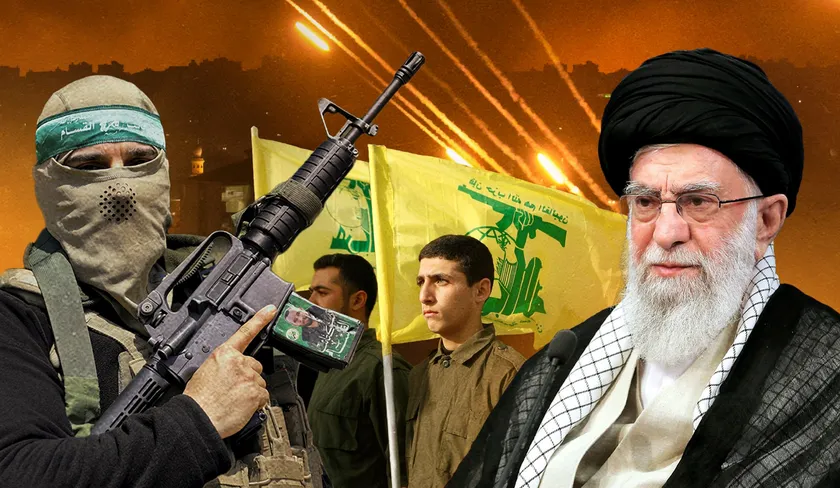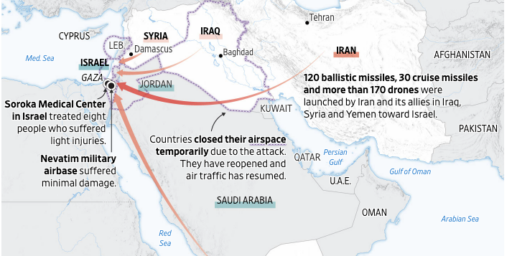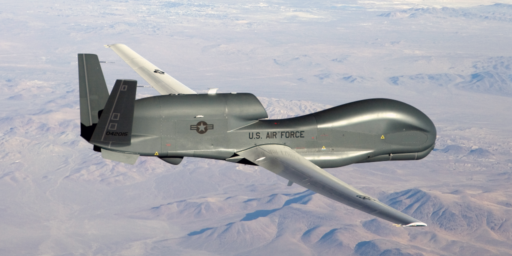US Preparing for Iranian Retaliatory Strike
The dance continues.

CNN (“US preparing for significant Iran attack on US or Israeli assets in the region as soon as next week“):
The US is on high alert and actively preparing for a “significant” attack that could come as soon as within the next week by Iran targeting Israeli or American assets in the region in response to Monday’s Israeli strike in Damascus that killed top Iranian commanders, a senior administration official tells CNN.
Senior US officials currently believe that an attack by Iran is “inevitable” – a view shared by their Israeli counterparts, that official said. The two governments are furiously working to get in position ahead of what is to come, as they anticipate that Iran’s attack could unfold in a number of different ways – and that both US and Israeli assets and personnel are at risk of being targeted.
A forthcoming Iranian attack was a major topic of discussion on President Joe Biden’s phone call with Israeli Prime Minister Benjamin Netanyahu on Thursday.
As of Friday, the two governments did not know when or how Iran planned to strike back, the official said.
A direct strike on Israel by Iran is one of the worst-case scenarios that the Biden administration is bracing for, as it would guarantee rapid escalation of an already tumultuous situation in the Middle East. Such a strike could lead to the Israel-Hamas war broadening into a wider, regional conflict – something Biden has long sought to avoid.
It has been two months since Iranian proxies attacked US forces in Iraq and Syria, a period of relative stability after months of drone, rocket and missile launches targeting US facilities. The lone exception came on Tuesday, when US forces shot down a drone near al-Tanf garrison in Syria. The drone attack, which the Defense Department said was carried out by Iranian proxies, came after the Israeli strike on the Iranian embassy in Damascus.
“We asses that al-Tanf was not the target of the drone,” a defense official said Tuesday. “Since we were unable to immediately determine the target and out of safety for US and coalition partners, the drone was shot down.”
This is a bizarre dance but one that’s been going on for more than four decades. The parties are at war in all but name but none want it to escalate to catastrophic levels.
Iran, like so many others in the region, is vying for power and influence. The use of proxies (most notably Hezbollah and Hamas but there are many others) and irregular forces (the IRGC and its Quds Force) are their primary military tools. They’ve killed hundreds of Americans over the years, including at least 608 in Iraq alone. It’s less clear how many Iranians we have killed, directly or indirectly, but likely more given our support for Iraq during the decade-long Iran-Iraq War.
Israel’s targeting of Quds Force leadership is perfectly reasonable and, indeed, presumably expected. But that doesn’t mean Iran won’t respond. Even totalitarian regimes have domestic politics and they can’t be seen to let Israel get away with the attack. Israeli leaders are fully aware of this. The question is whether it will be a proportional response or one that seriously escalates the shadow war. My strong guess is the former.






I hope that the likelihood of a retaliatory attack following the attack on Damascus was wargamed long before the attack by Israel with US input. I say “hope” because I am not confident that it happened. Once I had good confidence in Israeli military intelligence and planning, but the October 2023 Hamas attacks show that Israel was asleep, or maybe Netanyahu was cynically allowing it to happen to consolidate his power. In any event, the US is in the position of someone who has a relative who is irresponsible and a spendthrift. At some point it stops being worthwhile to support them. Was the Damascus attack undertaken with our knowledge and with good plans for the inevitable countermove by Iran? If not then we must let the region know that we’re going to keep out of this mess.
I have long thought that the US should work toward better relations with Iran.
Netanyahu does seem to be looking for a götterdämmerung. We should not play that game, but if the Ayatollahs overplay their hand, our hand may be forced. So, I’d bet that the Iranians are too smart to attack the US in an escalatory, or even proportional way – I don’t think they’ll be blowing up US embassy buildings, more likely missile attacks against US forces in Syria. They will certainly hit Israel in some way. We should of course deplore that, but nothing more.
I can understand @Gustopher’s desire to say, screw you guys, we’re going home. But someone needs to keep the magic black juice flowing through the Red Sea and the Gulf, for our allies Japan and South Korea, our European allies, our friends in Taiwan and India. There is no other navy ready to step up, and we don’t want to see a PLAN that’s that capable. No one wants to see Chinese warships in the Gulf, or even in the Mediterranean.
Then there’s the strong likelihood that if we pull back the Saudis will feel the need to become a nuclear power since they’d no longer have the US as a counterweight to Iran. Which would ensure that Iran assembled bombs. (And then, Turkey would start.) The country Saudi Arabia would have to turn to in the case of US retrenchment, would be Israel. As bad as things are, a Sunni/Jewish alliance against Iran, with all parties nuking-up, would not be an improvement. And of course the Palestinians would be forgotten. The Saudis have bigger fish to fry. Note the absence of Arab governments giving a fuck about Gaza.
So, we’re stuck because un-sticking would make the prospect of a nuclear war in the ME, with attendant global economic collapse, more likely. At least that’s how I war-game it.
Only Iranians have agency, apparently.
Perhaps Israel should be factoring the very likely response in when they bomb someone’s consulate. Was killing those particular people, at that time and in that place worth a response that will “guarantee rapid escalation of an already tumultuous situation in the Middle East”?
This back and forth has been going on for years, and both sides have agency. I don’t think we gain enough from our relationship with Israel to tie ourselves so closely with their actions.
“Israel’s targeting of Quds Force leadership is perfectly reasonable and, indeed, presumably expected.”
Not really. By all accounts, Iran has been trying to avoid having its proxies (especially Hezbollah) take actions to escalate the Gaza situation. So it appears that Netanyahu, having failed to create a more active war against Hezbollah, decided to raise the stakes by attacking Iran more directly.
@Gustopher: “Was killing those particular people, at that time and in that place worth a response that will “guarantee rapid escalation of an already tumultuous situation in the Middle East”?”
I think the answer is “yes, as long as a widening war will keep Netanyahu in power and out of jail for a little longer.”
Unless all these senior Iranian personnel, along with reps from Hezbollah and various militant groups, were getting together for their weekly bridge game, the timing of the attack was likely driven by having so many people on Israel’s hit list collected in one place at one time, with intelligence showing they would be there (Iranian counter-intelligence is not having a good week).
Once Israel has this information, the decision then becomes whether to strike or not to strike. IOW, the conspiracy theory about Israel purposely timing the attack for this particular moment fundamentally misunderstands how these things work. To me, this was almost certainly a target of opportunity that could be acted on or not, and unsurprisingly Israel acted.
As for retaliation, Iran, despite the very long-standing bloviation by right-wing nutjobs about the crazy Mullahs, has always been a very cold, calculating player. They did take the time to warn the US including to stay out of their way, but unfortunately weren’t specific. I think it’s extremely unlikely that Iran will attack US assets and will actually seek to avoid the appearance of doing so.
So the question becomes – what they might target. They have a long history of attacking Jewish and Israeli targets worldwide via proxies, but this one will most likely have a clear Iranian return address. Israel has already taken measures, like evacuating embassies and facilities deemed vulnerable, and there is nothing equivalent to the Iranian situation in Syria for Israel, where Israeli assets operate in a weak state in the midst of a civil war that can be attacked with impunity. Sending missiles to strike Israeli consulates in third countries does not seem like a realistic option because it will piss off those third countries.
So that leaves Israel itself. A limited strike, perhaps against the base where the fighter aircraft that attacked the meeting are stationed, similar to Iran’s retaliation against the US for Soleimani, is the most obvious possibility. Iran probably won’t be as careful to avoid killing Israelis as they were killing Americans. Of course, Israel has very capable air and ballistic missile defenses, and that is such an obvious target that Israel will likely be prepared. And there is always a very big danger when launching ballistic missiles at a country with a nuclear ballistic missile strike capability. So that’s a big risk for Israel in a number of ways.
Something safer in terms of not starting a bigger conflict, that is logistically easier and more likely to succeed, and also provides a political message of solidarity against the “occupation,” would be attacking Israeli military installations in the Golan. It’s adjacent to Syria, a permissive country to operate in and over; it’s further from Israeli air defense, making an attack more likely to succeed; from a force escalation standpoint, it’s much safer to have missiles impacting there where there isn’t much of truly strategic value rather than overflying the heart of Israeli territory and hitting Israel’s most important airbase. That’s my best guess at this point, but it’s a low-confidence guess.
The Quds are in Syria to fight ISIS too. They are, in this matter, our allies.